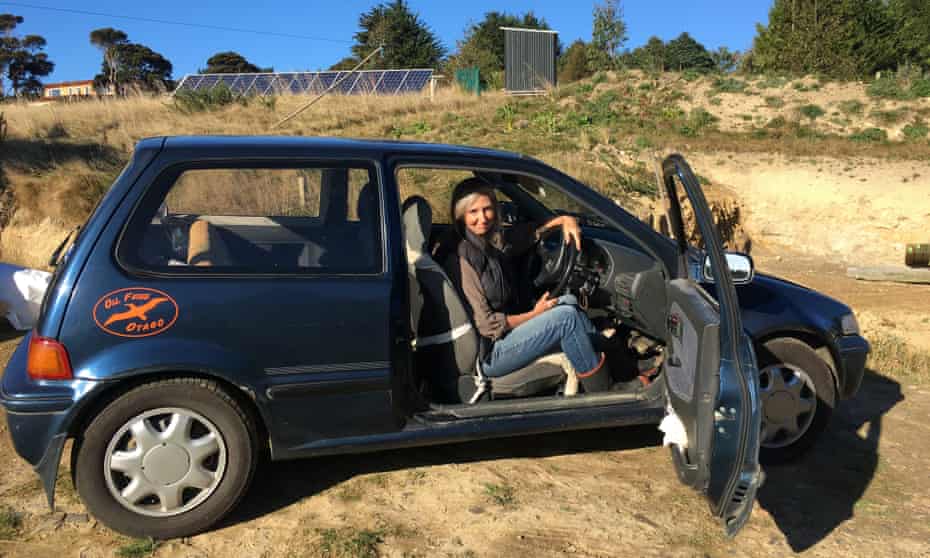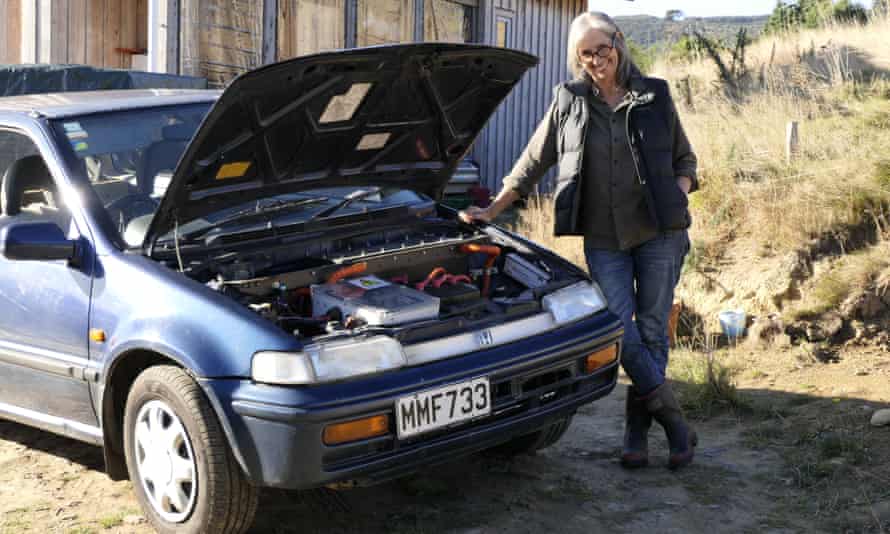New Zealand woman creates her own electric car for $24,000
Rosemary Penwarden says the vehicle, powered by home rooftop solar, has been running smoothly for three years and has thanked oil companies for the motivation

Fri 27 May 2022 13.36 BST
First published on Fri 27 May 2022 04.15 BSTA New Zealand woman has converted a 29-year-old wreck into a homemade, electric vehicle, “to show it can be done”.
Rosemary Penwarden has been driving her converted vehicle around South Island roads for three years now. The project took her and a friend more than eight months of solid work and tinkering. “You do have to be a little bit mad,” she said. “I want to thank the oil companies for the motivation.”
Penwarden bought a 1993 car body from a wrecker’s, and took the combustion engine out herself. She replaced it with a new gearbox and electric engine, then packed the front and back of the car with batteries – 24 under the hood, and 56 in the boot.
In total the project, including labour, cost Penwarden $24,000 (£12,300). The car is fully signed-off and warranted. After several years on the road, her project recently came to the attention of local reporters.

Refrigeration engineer Hagen Bruggemann, who helped Penwarden convert her car, has now converted about eight cars to electric engines. “You can talk as much as you want about all this environmental crap, but you have to implement it,” he says.
Without free labour, he says converting a car is not a financially viable option for most people – but there’s a strong commercial argument for converting trucks and larger vehicles, where the body tends to be worth much more than the engine. Converting a diesel truck, he says, would pay off within five years. “Really, the polluters should be paying – I don’t see why they’re not,” he says.
A longtime environmental campaigner, Penwarden says the time and money she devoted to converting her car isn’t possible for everyone – “I’m in a very privileged place” – but as the world adapts to the climate crisis, she wanted to illustrate the possibility. She charges the car at her home, which is fully solar-powered.
While Penwarden believes the car will pay itself off – she had once spent up to $100 a week on petrol for commuting – she says it wasn’t a cost-saving exercise and called on the government to support conversions. “Just to be able to show that it can be done is a priceless thing,” she says. “The biggest thing is to help stop the biggest polluters as soon as possible – and nothing that we can do as individuals I think matters quite as much as that.”
… as you’re joining us today from New Zealand, we have a small favour to ask. Tens of millions have placed their trust in the Guardian’s fearless journalism since we started publishing 200 years ago, turning to us in moments of crisis, uncertainty, solidarity and hope. More than 1.5 million supporters, from 180 countries, now power us financially – keeping us open to all, and fiercely independent.
Unlike many others, the Guardian has no shareholders and no billionaire owner. Just the determination and passion to deliver high-impact global reporting, always free from commercial or political influence. Reporting like this is vital for democracy, for fairness and to demand better from the powerful.
And we provide
all this for free, for everyone to read. We do this because we believe
in information equality. Greater numbers of people can keep track of the
global events shaping our world, understand their impact on people and
communities, and become inspired to take meaningful action. Millions can
benefit from open access to quality, truthful news, regardless of their
ability to pay for it.
Link to original article
No comments:
Post a Comment